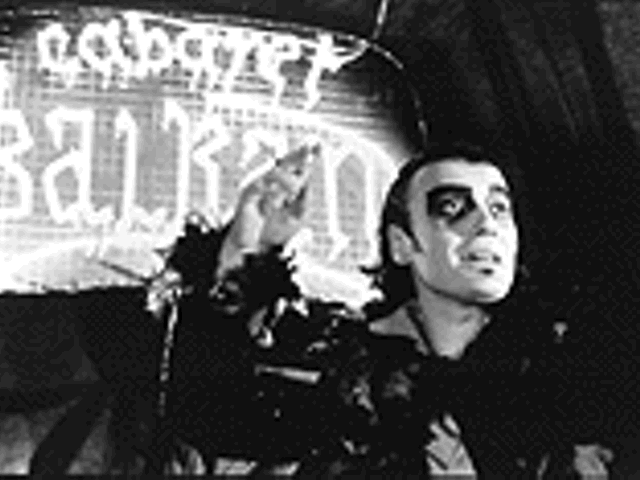The Book of Life. Hal Hartley. A well-groomed, nattily attired Jesus, made flesh in the person of Hartley regular Martin Donovan, descends to Earth via jet — point of origin unspecified (Rome? Jerusalem?) — accompanied by fetching assistant Magdalena (played with surprising assurance by singer P.J. Harvey), alighting in NYC to fulfill the Revelations' apocalyptic prophesies. Retrieving the Book of Life — stored as a computer file on a laptop — from a bowling-alley locker, He points His rolling-ball clicker at the seven-seals icons and begins the process of ending the world. As this precis illustrates, Hartley takes a playful approach to his subject, but that doesn't mean he's not grappling with weighty issues: The film's seriocomic dialogues — among the Devil (a delightfully vexed Thomas Jay Ryan), Jesus and an inveterate gambler (Dave Simonds) who casually barters away his girlfriend's soul — explore substantive theological and philosophical matters, but always with wryness and amused irony. Hartley shot The Book of Life on digital video, blowing up the result to 35mm, and the ghostly afterimages that trail figures in motion lend the film a disturbing and beautifully apt quality of unease. (CF)
Life on Earth. Abderrahmane Sissako. In the only African film in the 2000 Seen By collection, Parisian-based director Abderrahmane Sissako returns to his father's isolated Mali village of Sokolo to offer a restorative alternative to stressful, overly mechanized lives. In Sokolo, as the day progresses, men leisurely inch their chairs from sun to shade, inhabitants cut through dusty streets in donkey-drawn carts and on bicycles, women gather water and children herd goats as a lone motor scooter noisily passes. A photographer takes a few portraits, hair is cut, baths are taken, men lounge and read — all outside. Hopeful individuals wait at the post office for the telephone to ring or a call to connect, though London may answer when the customer wants Paris. As one person says, "Communication is a question of luck" and must be desired to be achieved. Meantime, ironically, the omnipresent, battery-powered radio reports the millennium countdown at the Eiffel Tower. In addition to European news, casual local hosts intersperse readings that, without rancor, acknowledge an impoverished colonial legacy. As Sissako says, "I don't see how a contemporary approach can be positive if it goes about blaming," but he's not oblivious to harsh realities. He quotes Aimé Césaire, "My ear to the ground, I heard tomorrow pass." And yet you can't accommodate this semidocumentary without feeling your biorhythm change — for the better. This is a discursive film about nothing monumental and about everything important, about how to reclaim Life on Earth. In French and Bambara with English subtitles. (DC)
The First Night of My Life. Miguel Albaladejo. Hold the portentous allegories and rumblings of apocalypse: This lively account of a wild night of loose ends and missed connections in Madrid could take place on any day of the year and lose none of its charm. True, director Albaladejo tosses in a few snippets of millennial dialogue and allows himself one loaded but discreetly handled plot element (if you see a heavily pregnant woman in the first few minutes of a movie — especially one taking place on New Year's Eve — you can guess what the climactic moment will be), but those are the only predictable things in this spiraling social comedy. The film crosses class and social lines, from petty thieves and beggars to social workers, hitchhikers, costumed partygoers and convenience-store workers; from a juvenile car thief who appreciates the Three Tenors to his victim, an out-of-place conservative who befriends a bored young woman whose boyfriend — the car thief — then offers him a ride home in his own car. The First Night of My Life celebrates a spiraling humanity in which everyone has a place. In Albaladejo's film, the nicest thing about the first day of the last year of the century is that it starts with a morning just like any other. In Spanish with English subtitles. (RH)
The Wall. Alain Berliner. A slight but charming variant on Romeo & Juliet, The Wall elaborates from the real tension between Flemish and French speakers in Belgium to imagine a country divided by a physical, not just a linguistic, wall. Franophone chip-stand proprietor Albert (Daniel Hanssens) has the misfortune of falling in love with a Flemish girl (Pascale Bal) on the night — New Year's Eve 1999 — the language barrier is erected. Compounding his problems, the wall cleaves in half his chip wagon, which straddles the border of the two new countries (Belgians, after all, are united in their love of pommes frite). Berliner, the director of Ma Vie en Rose, handles this potentially heavy-handed allegory with a feather-light touch (e.g., a delightful interlude in which the portly Hanssens dances gracefully with a broom) and freely introduces elements of the supernatural and surrealism into his fabulist tale — appropriate, the characters self-reflexively comment, in the land of Magritte. In Flemish and French with English subtitles. (CF)
The Hole. Tsai Ming-liang. The last week of the millennium arrives in Taipei on the heels of meteorological and biological catastrophes. Heavy, incessant rain drones on while human beings scurry about, behaving like the cockroaches that transmit the resistant virus destroying our species. Taiwan's Health Association can't contain the epidemic but quarantines and then evacuates a public housing project. Two reclusive residents have their apartments joined by a hole drilled into her ceiling/his floor as a plumber attempts to repair a leak. Tentatively, awkwardly, the man and the woman connect through this umbilical channel. Periodically, these two make brief forays out of their rooms. Director Tsai Ming-Liang interjects incongruous action as the woman indulges in fantasies of herself as the lead singer in popular 1950s song-and-dance numbers, the only moments to relieve this dreary, claustrophobic film. With little dialogue and minimal action in this metaphoric fable, this man and this woman might be the most boring people left on earth, and they certainly deserve each other. Tsai says he harbors no optimistic thoughts about the future. Neither do I after seeing The Hole. In Mandarin with English subtitles. (DC)
The Sanguinaires. Laurent Cantet. Hoping to avoid the New Year's Eve hysteria, a group of friends leave France to vacation on a rough, desolate Mediterranean island. Though they claim to simply want a peaceful holiday, it soon becomes obvious that at least one of the party, François (Frédéric Pierrot) sees the trip as a moral test of wills, a psychological arm-wrestling match with an opponent that neither he nor the film can clearly define. Though François' repetitious vitriol is as close to drama as the film gets — you could call it beating a dead horse, to use a figure of speech that becomes unpleasantly literal near the film's end — it quickly becomes fuzzy and tiresome, as does the film itself. In French with English subtitles. (RH)
Webster University screens The Book of Life and Life on Earth as a double bill at 7 p.m. Sept. 10 and 8:30 p.m. Sept. 12; The First Night of My Life at 9:15 p.m. Sept. 10 and 7 p.m. Sept. 12; The Wall at 7 p.m. Sept. 11 and 8:30 p.m. Sept. 17; The Hole at 8:30 p.m. Sept. 11 and 7 p.m. Sept. 18-19; and The Sanguinaires at 7 p.m. Sept. 17 and 9:15 p.m. Sept. 18.






